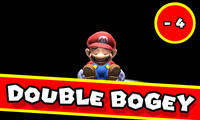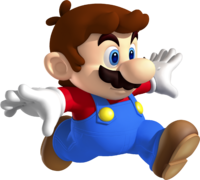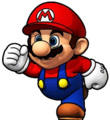Small Mario: Difference between revisions
Ma-sansunsun (talk | contribs) |
Ma-sansunsun (talk | contribs) |
||
| Line 89: | Line 89: | ||
==Names in other languages== | ==Names in other languages== | ||
{{foreign names | {{foreign names | ||
|Jap=<span class="explain" title="チビ">ちび</span>マリオ<br>''{{wp|Chibi (slang)|Chibi}} Mario''<br>ノーマルマリオ<br>''Nōmaru Mario''<br>マリオ<ref>[https://www.nintendo.co.jp/software/smb1/material/pdf/smb_manual.pdf '' | |Jap=<span class="explain" title="チビ">ちび</span>マリオ<br>''{{wp|Chibi (slang)|Chibi}} Mario''<br>ノーマルマリオ<br>''Nōmaru Mario''<br>マリオ<ref>[https://www.nintendo.co.jp/software/smb1/material/pdf/smb_manual.pdf ''Super Mario Bros.'' Japanese instruction manual]</ref><br>''Mario'' | ||
|JapM=Small Mario<br>Normal Mario<br>Mario | |JapM=Small Mario<br>Normal Mario<br>Mario | ||
|Spa=Peque Mario | |Spa=Peque Mario | ||
Revision as of 06:12, March 8, 2021
- "Little Mario" redirects here. For the character also referred to as "Little Mario" in early arcade materials, see Mario.
- Not to be confused with Mini Mario.
Small Mario (also referred to as Little Mario,[1] Regular Mario,[2] or simply Mario[3]) is the weakest form of the player character in the main Super Mario games. This form does not have any special abilities, and it also does not take any power-ups to assume this form, unlike other forms. Super Mario turns into Small Mario when he is hit by an enemy or obstacle. The player almost always starts the game off in this form; Super Mario Bros. 2, Super Mario 3D Land, Super Mario 3D World, and Captain Toad: Treasure Tracker are notable exceptions, as in these games, the player starts each life in Super form regardless of what form they took prior to losing a life.
Any damage taken in Small form will cause Mario to lose a life. Usually, before being able to assume even stronger forms, Small Mario first must become Super Mario by collecting a Super Mushroom. Being Small Mario can sometimes be useful; in some games, such as Super Mario Land, there are small crevices that can be passed through easily with Small Mario.
History
Super Mario series
Super Mario Bros. / Super Mario Bros.: The Lost Levels
Small Mario first appears in Super Mario Bros.. Unlike more modern appearances, starting with Super Mario World, Mario will not be turned into the form granted by a higher-tiered power-up (like a Fire Flower), but rather will only become Super Mario. This behavior is the same in Super Mario Bros.: The Lost Levels and the original and Super Mario All-Stars versions of Super Mario Bros. 3 (this only applies to the Fire Flower and Super Leaf in Super Mario Bros. 3, though).
Also, in this game, as well as Super Mario Bros.: The Lost Levels (where Mario can also be hurt by touching a Poison Mushroom), the Japanese Family Computer version of Super Mario Bros. 3, and the original version of Super Mario World, taking damage as Fire Mario (or Raccoon or Cape Mario in the latter two games, respectively) immediately shrinks Mario down to his Small form.
Due to certain glitches in Super Mario Bros. and the Japanese version of Super Mario Bros. Deluxe, it is possible to turn into Fire Mario while remaining Small.
Super Mario Bros. 2 / Super Mario Advance
In Super Mario Bros. 2, Mario, Luigi, Toad and Princess Toadstool start out each life in Super form (at the start of each level, they only have two hit points; they start with the current maximum hit points full after defeat), regardless of what their form was upon defeat or exiting the previous level. They become Small if they only have one hit point left. By finding the two Mushrooms hidden in Subspace, the characters can extend their maximum hit points to four; also, upon the Mushroom's collection, the character always regains full health.
In Super Mario Advance, the Small form persists between levels (unless the player finished the previous level in their Super form, in which case it transfers to that level for that life only, even if the player switches characters), the characters start the game and each life in their Small forms with only one hit point remaining (of the current maximum), rather than their Super forms, and the maximum hit points per level is five, due to an added Mushroom per level.
In the original NES version, when characters are in their Small forms, only their lower halves shrink while their upper halves remain intact. In the All-Stars remaster and Super Mario Advance, this was changed so that their entire bodies shrink. As a result, Peach is also affected, as her hair becomes shorter as she shrinks into her Small form, rather than remaining intact like in the original NES version.
Super Mario Bros. 3
In international versions of Super Mario Bros. 3, Mario now reverts to his Super form instead of his Small form if he takes damage in a second-tier form (e.g. Fire, Raccoon). This also applies to almost all 2D Super Mario games after Super Mario World (including its remake, Super Mario World: Super Mario Advance 2). However, in the Japanese version of the game, Mario still reverts back to his Small form regardless of what power-up he was using. This also applies when Mario has a Goomba's Shoe.
In Super Mario Advance 4: Super Mario Bros. 3, the original Japanese version's damage system is one of the effects that the Red Switch has on the game.
Super Mario World
As of Super Mario World, grabbing any higher-tiered power-up as Small Mario will bypass the Super form (e.g. grabbing a Fire Flower turns Small Mario right to Fire Mario). This property was also included in the GBA version of Super Mario Bros. 3, Super Mario Advance 4: Super Mario Bros. 3 (though it was formerly a glitch in the original and Super Mario All-Stars versions of that game).
New Super Mario Bros. Wii
In New Super Mario Bros. Wii, the Toads to be saved in the levels become Small Toads after being hit once by enemies; if brought to the Flagpole in this state, they will only give Mario one extra life, rather than three.
Super Mario 3D Land
In Super Mario 3D Land, Small Mario makes its 3D Super Mario debut, as previous 3D Mario games had a health meter. In this form, Mario and Luigi lose their caps, making this form similar to Wario's Small form, as seen in Wario Land: Super Mario Land 3 (unless the player collects the maximum amount of lives (1,110 lives), which has Super Mario/Luigi lose the cap instead). Their voices are also higher-pitched. However, like in Super Mario Bros. 2, Mario and Luigi start out each life in their Super forms.
Super Mario 3D World / Super Mario 3D World + Bowser's Fury
Small forms are introduced in Super Mario 3D World for Rosalina and Captain Toad. The Toad Brigade also gain Small forms in Super Mario 3D World + Bowser's Fury. Peach and Toad can also become this form for the first time since Super Mario Bros. 2. The form works as it does in Super Mario 3D Land. As such, Peach and Rosalina's hair gets shorter (looking much like their younger counterparts), and the Toads' cap colors are reversed.
In the Bowser's Fury campaign, Mario reverts to a giant version of his Small form upon taking damage twice consecutively from his Giga Cat form without touching another power-up item. Despite being much larger, this version of Small Mario is defeated if damaged by an attack from Fury Bowser. Out of Giga Bell fights, Small Mario can collect a Cat Shine to turn back into Super Mario.
Additionally, Super Mario Bros.-styled Small Luigis appear in some Luigi sightings, in addition to being the icon for Luigi Bros. One also appears as the stamp obtained in the Sprixie House in World Crown.
Super Mario Run
In versions of Super Mario Run prior to Version 3.0.4., only Mario and Luigi can shrink into their Small forms, thus Peach, Toad, Toadette, and the Yoshis are defeated in one hit and therefore do not have their Small forms. In versions since Version 3.0.4., all the characters (including then-added Daisy) are now given Small forms, therefore letting them take one more hit before being defeated. As a result, the characters lose their advantage over Mario and Luigi and require their regular forms to break Brick Blocks, although they still start the level in their regular forms as they did in prior versions, unlike Mario and Luigi.
Characters return in their Small form after being defeated or falling in a hole or in lava (or if they are in their usual regular forms upon touching lava, they shrink in the bubble to their Small forms) even though they start the level in their regular forms, like how they did in earlier versions. However, in the Remix 10 mode, their form is determined based on whether Mario completed the fourth course while Small or Super, similar to Super Mario Advance. For example, if Mario is Small when he completes the fourth course and switches to Peach, she starts off in her Small form, as opposed to her regular form.
As in Super Mario Bros. 2's remakes and Super Mario 3D World, Peach's hair gets shorter when she shrinks into her Small form.
Mario Golf: World Tour / Mario Sports Superstars

When Mario gets a Double Bogey or below in Mario Golf: World Tour and Mario Sports Superstars, his animation depicts him getting hit by a shell, which turns him into Small Mario.
Captain Toad: Treasure Tracker
Captain Toad and Toadette's Small forms appear in Captain Toad: Treasure Tracker, retaining the features from Super Mario 3D World (including Captain Toad's reversed cap colors and their higher-pitched voices); Toadette's cap instead turns light pink with magenta spots. However, as in the original and All-Stars versions of Super Mario Bros. 2, the Small form does not persist between levels; every level is started in Super form, regardless of what form the previous level was finished in.
Puzzle & Dragons: Super Mario Bros. Edition
Small Mario appears in Puzzle & Dragons: Super Mario Bros. Edition as the player's starting form, available at the beginning of the game. The player must play as either Small Mario or Small Luigi until clearing the tower in World 1, at which point Super Mario and Super Luigi become available as playable characters. Most characters attribute a pair of elements, while Small Mario only attributes the fire element.
Development
When developing Super Mario Bros., players were originally supposed to start as Super Mario. However, because of the way the camera was zoomed in during development, it made seeing around Mario difficult. After pulling the camera away, Mario appeared smaller, at which point Toshihiko Nakago suggested they make Mario smaller instead of pulling the camera away. The team then decided that Super Mario would shrink into Small Mario if he touches an enemy, but if Small Mario touches an enemy, he'll be defeated instead.
When asked if Shigeru Miyamoto considered letting the players start as Super Mario rather than Small Mario, he responded with "Starting with the small Mario would make players happier when Mario got big later, and it would also give a better impression to players."[4]
Gallery
- For this subject's image gallery, see Gallery:Small Mario.
Names in other languages
| Language | Name | Meaning | Notes |
|---|---|---|---|
| Chinese (simplified) | 迷你马力欧[5] (Super Mario 3D Land) Mínǐ Mǎlì'ōu 小马力欧 (Super Mario Maker 2) Xiǎo Mǎlì'ōu |
Mini Mario Small Mario |
|
| Chinese (traditional) | 小瑪利歐[8] Xiǎo Mǎlì'ōu |
Small Mario | |
| Dutch | Kleine Mario[?] | Small Mario | |
| German | Klein-Mario[?] | Small Mario | |
| Italian | Piccolo Mario[?] | Small Mario | |
| Korean | 꼬마리오[7] Kkomario |
Portmanteau of 꼬마 kkoma (kid) and 마리오 (Mario) | |
| Portuguese (NOA) | Mario pequeno[?] | Small Mario | |
| Portuguese (NOE) | Mario Pequeno[?] | Small Mario | |
| Russian | Маленький Марио[?] Malen'kiy Mario |
Small Mario | |
| Spanish | Peque Mario[?] | Pun on the word pequeño (small) |
References
- ^ Tatsumi Yamashita, The Official Nintendo Player's Guide, Tokuma Shoten, 1987, ISBN 999832369X. Page 29.
- ^ Super Mario Bros. Deluxe Prima Games guide, page 8.
- ^ Super Mario Bros. English instruction manual, page 8.
- ^ https://www.nintendo.com/nes-classic/super-mario-bros-and-super-mario-bros-3-developer-interview
- ^ https://www.ique.com/3ds/arej/about/about2.html
- ^ Super Mario Bros. Japanese instruction manual
- ^ New Super Mario Bros. Instruction manual, Nintendo Korea
- ^ https://www.nintendo.com.hk/3dland/about/index.html
- Mario's Transformations
- Hotel Mario
- New Super Mario Bros. Forms
- New Super Mario Bros. 2 Forms
- New Super Mario Bros. U Forms
- New Super Mario Bros. Wii Forms
- Puzzle & Dragons: Super Mario Bros. Edition Leaders and Helpers
- Super Mario 3D Land Forms
- Super Mario 3D World Forms
- Super Mario 3D World + Bowser's Fury Forms
- Super Mario Bros.
- Super Mario Bros.: The Lost Levels
- Super Mario Bros. 2
- Super Mario Bros. 3 Forms
- Super Mario Bros. Deluxe
- Super Mario Land Forms
- Super Mario Land 2: 6 Golden Coins Forms
- Super Mario Maker Forms
- Super Mario Maker 2 Forms
- Super Mario World Forms





